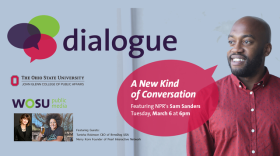Dialogue

A New Kind of Conversation
Dialogue is a series of provocative discussions about the most challenging issues facing our community and country held in partnership with Ohio State’s John Glenn College of Public Affairs.
Upcoming Events
Check back for information about the next Dialogue event.
Past Events
-
-
With the nation so deeply polarized and candidates racing to their parties’ extremes, some are looking for different ways to run elections and pick those who represent us.
-
Intel’s plan to build a massive computer chip manufacturing complex in New Albany offers a glimpse of what’s next for Ohio’s economic future. Could Ohio move from the buckle of the rust belt to the hub of the Silicon Heartland?
-
Two months after The U.S. Supreme Court overturned Roe vs. Wade, the fight over abortion has moved to the state courts and state legislatures. Left to navigate the new reality are doctors, nurses, and of course, people seeking reproductive health care.
-
Two years after the pandemic largely shut down the economy and threw millions out of work, many have yet to return to their jobs – or at least to their old jobs.
-
As Russia’s invasion of Ukraine continues and expands, what are the pathways to peace? How would these different pathways for ending the conflict impact Ukraine, Russia, the United States and Europe?
-
Social justice awareness has brought new attention to the nearly 50-year-old academic framework of Critical Race Theory which argues racism is embedded in the American legal and economic systems. Not everyone agrees, and they argue supporters of CRT are trying to divide America and re-write history.
-
After decades of only minimal price increases, the annual inflation rate has reached seven percent. Heating costs have risen sharply over last year. Experts blame supply chain disruptions, rising wages and government stimulus checks for the sudden spikes in prices and energy costs.
-
This Dialogue discussion will lay out their visions and what new police leadership could mean for the City of Columbus.
-
This Dialogue discussion focuses on Central Ohio’s rapidly changing housing situation and explores what it will take to ensure everyone can afford to live here.
-
The COVID-19 pandemic has forced abrupt changes upon museums, live performance groups, and other cultural organizations. Some moved operations outdoors, others relied increasingly on technology to connect with patrons, and others shuttered for a time.
-
Globally, 2020 was the second hottest year on record as global temperatures increased at an unprecedented rate due to human activity. As climate change progresses, what is the point where we no longer can reverse the damage?
-
We look at where those promised reforms stand and examine efforts to heal the divide between the police and people of color.
-
The COVID-19 pandemic forced abrupt changes for students, parents, and educators.
-
The coronavirus has affected people of color at a disproportionate rate. While we’re coping with a new virus, it’s not a new problem. African Americans, Hispanics and Native Americans have long suffered worse health effects than White Americans.
-
Polls show that health care is among the most important issues for voters in the 2020 election. Spending on medical care has skyrocketed in the past 20 years and is weighing on both workers and employers. What is the answer?
-
Socialism used to be a dirty word in American politics, but many of the candidates running for president are openly suggesting some socialist policies might be a good thing for America.
-
Disinformation – the purposeful spread of false or misleading information — is an ancient phenomenon but has exploded in recent years thanks to modern technologies including social media.
-
We discuss whether your school board or your employer can force you to be vaccinated.
-
Lightly regulated capitalism leads to boom-bust cycles that threaten the livelihood of the middle class and poor in times of crisis. Join us for a discussion on how to close the income gap.
-
With March Madness underway, we will take a look at the prominent role sports play in American society.
-
Fifty-seven years after John Glenn became the first American to orbit the earth, the United States finds itself in a world in which many nations, as well as private companies, have established independent space capabilities.
-
Since the 1970s, workers without college degrees have seen their full-time employment fall, real wages decline and family income stagnate. The 2016 presidential election served notice that the working class, especially working-class men, felt overlooked, alienated, angry and were desperate for new leadership.
-
A discussion of the results of the 2018 Midterm Elections and where we go from here.
-
The increased use of automation, artificial intelligence and global competition is changing the way people work. What kind of impact will technological progress, demographic change, and other market forces have on jobs, skills and wages in the future?
-
This Dialogue event considers if the “Forever War” will ever end – US military engagement in Iraq, Iran, Afghanistan and extended conflicts in the Middle East. And what this continuing commitment of troops overseas means for national security at home and abroad.
-
The gender gap remains wide in Ohio public office. Even though women make up the majority of the population, they are still in the minority in elected office.
-
Sam Sanders, host of NPR’s It’s Been a Minute, moderates a discussion about the New Age of Entrepreneurship with Tanisha Robinson, CEO, BrewDog USA and Merry Korn, President/CEO, Pearl Interactive Network.




























